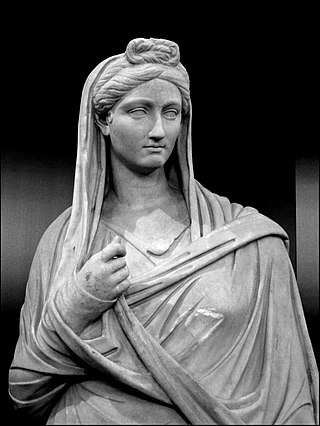Related Research Articles

Gaius Valerius Catullus, often referred to simply as Catullus, was a Latin poet of the late Roman Republic who wrote chiefly in the neoteric style of poetry, focusing on personal life rather than classical heroes. His surviving works are still read widely and continue to influence poetry and other forms of art.
The elegiac couplet is a poetic form used by Greek lyric poets for a variety of themes usually of smaller scale than the epic. Roman poets, particularly Catullus, Propertius, Tibullus, and Ovid, adopted the same form in Latin many years later. As with the English heroic couplet, each pair of lines usually makes sense on its own, while forming part of a larger work.

Clodia, nicknamed Quadrantaria, Nola, Medea Palatina by Cicero, and occasionally referred to in scholarship as Clodia Metelli, was one of three known daughters of the ancient Roman patrician Appius Claudius Pulcher.
Sulpicia was the author, in the first century BCE, of six short poems written in Latin which were published as part of the corpus of Albius Tibullus's poetry. She is one of the few female poets of ancient Rome whose work survives.

Freeborn women in ancient Rome were citizens (cives), but could not vote or hold political office. Because of their limited public role, women are named less frequently than men by Roman historians. But while Roman women held no direct political power, those from wealthy or powerful families could and did exert influence through private negotiations. Exceptional women who left an undeniable mark on history include Lucretia and Claudia Quinta, whose stories took on mythic significance; fierce Republican-era women such as Cornelia, mother of the Gracchi, and Fulvia, who commanded an army and issued coins bearing her image; women of the Julio-Claudian dynasty, most prominently Livia and Agrippina the Younger, who contributed to the formation of Imperial mores; and the empress Helena, a driving force in promoting Christianity.

Pro Caelio is a speech given on 4 April 56 BC, by the famed Roman orator Marcus Tullius Cicero in defence of Marcus Caelius Rufus, who had once been Cicero's student but more recently was a political rival. Cicero's reasons for defending Caelius are uncertain, but various theories have been postulated.
Satire VI is the most famous of the sixteen Satires by the Roman author Juvenal written in the late 1st or early 2nd century. In English translation, this satire is often titled something in the vein of Against Women due to the most obvious reading of its content. It enjoyed significant social currency from late antiquity to the early modern period, being read as a proof-text for a wide array of misogynistic beliefs. Its current significance rests in its role as a crucial body of evidence on Roman conceptions of gender and sexuality.

Lesbia was the literary pseudonym used by the Roman poet Gaius Valerius Catullus to refer to his lover. Lesbia is traditionally identified with Clodia, the wife of Quintus Caecilius Metellus Celer and sister of Publius Clodius Pulcher; her conduct and motives are maligned in Cicero's extant speech Pro Caelio, delivered in 56 BC.

Sexual attitudes and behaviors in ancient Rome are indicated by art, literature, and inscriptions, and to a lesser extent by archaeological remains such as erotic artifacts and architecture. It has sometimes been assumed that "unlimited sexual license" was characteristic of ancient Rome. Verstraete and Provençal opine that this perspective was simply a Christian interpretation: "The sexuality of the Romans has never had good press in the West ever since the rise of Christianity. In the popular imagination and culture, it is synonymous with sexual license and abuse."

Homosexuality in ancient Rome often differs markedly from the contemporary West. Latin lacks words that would precisely translate "homosexual" and "heterosexual". The primary dichotomy of ancient Roman sexuality was active/dominant/masculine and passive/submissive/feminine. Roman society was patriarchal, and the freeborn male citizen possessed political liberty (libertas) and the right to rule both himself and his household (familia). "Virtue" (virtus) was seen as an active quality through which a man (vir) defined himself. The conquest mentality and "cult of virility" shaped same-sex relations. Roman men were free to enjoy sex with other males without a perceived loss of masculinity or social status, as long as they took the dominant or penetrative role. Acceptable male partners were slaves and former slaves, prostitutes, and entertainers, whose lifestyle placed them in the nebulous social realm of infamia, excluded from the normal protections accorded to a citizen even if they were technically free. Although Roman men in general seem to have preferred youths between the ages of 12 and 20 as sexual partners, freeborn male minors were off limits at certain periods in Rome, though professional prostitutes and entertainers might remain sexually available well into adulthood.

The poetry of Gaius Valerius Catullus was written towards the end of the Roman Republic. It describes the lifestyle of the poet and his friends, as well as, most famously, his love for the woman he calls Lesbia.
Catullus 16 or Carmen 16 is a poem by Gaius Valerius Catullus. The poem, written in a hendecasyllabic (11-syllable) meter, was considered to be so sexually explicit following its rediscovery in the following centuries that a full English translation was not published until the 20th century. The first line, Pēdīcābo ego vōs et irrumābō, sometimes used as a title, has been called "one of the filthiest expressions ever written in Latin—or in any other language".
Poem 68 is a complex elegy written by Catullus who lived in the 1st century BCE during the time of the Roman Republic. This poem addresses common themes of Catullus' poetry such as friendship, poetic activity, love and betrayal, and grief for his brother. The poem is addressed to his friend, Manius or Allius, and engages with scenes from the myth of Troy.
Quintus Caecilius Metellus Celer, a member of the powerful Caecilius Metellus family who were at their zenith during Celer's lifetime. A son of Quintus Caecilius Metellus Nepos, or, according to some, the son of tribune Quintus Caecilius Metellus Celer while the latter is the son of Quintus Caecilius Metellus Nepos, was an ancient Roman statesman and general during the First Century BC. He became consul in 60 BC and previously he held the offices of praetor and augur.
The Lex Scantinia is a poorly documented Roman law that penalized a sex crime (stuprum) against a freeborn male minor. The law may also have been used to prosecute adult male citizens who willingly took a passive role in having sex with other men. It was thus aimed at protecting the citizen's body from sexual abuse (stuprum), but did not prohibit homosexual behavior as such, as long as the passive partner was not a citizen in good standing. The primary use of the Lex Scantinia seems to have been harassing political opponents whose lifestyles opened them to criticism as passive homosexuals or pederasts in the Hellenistic manner.
Andrew William Lintott is a British classical scholar who specialises in the political and administrative history of ancient Rome, Roman law and epigraphy. He is an emeritus fellow of Worcester College, University of Oxford.
Judith P. Hallett is Professor Emerita of Classics, having formerly been the Graduate Director at the Department of Classics, University of Maryland. Her research focuses on women, the family, and sexuality in ancient Greece and Rome, particularly in Latin literature. She is also an expert on classical education and reception in the nineteenth and twentieth centuries.
Julia Haig Gaisser is an American classical scholar. She is Eugenia Chase Guild Professor Emeritus of the Humanities and Professor of Latin at Bryn Mawr College, Pennsylvania. She specializes in Latin poetry and its reception by Renaissance humanists.
References
- ↑ Clodia Metelli: The Tribune's Sister. Women in Antiquity. Oxford, New York: Oxford University Press. 2011-01-26. ISBN 978-0-19-537501-5.
- ↑ Skinner, Marilyn Berglund (1977). Catullus' Passer: the arrangement of the book of polymetric poems (Thesis).
- ↑ "Worldcat Identities - Marilyn B. Skinner".